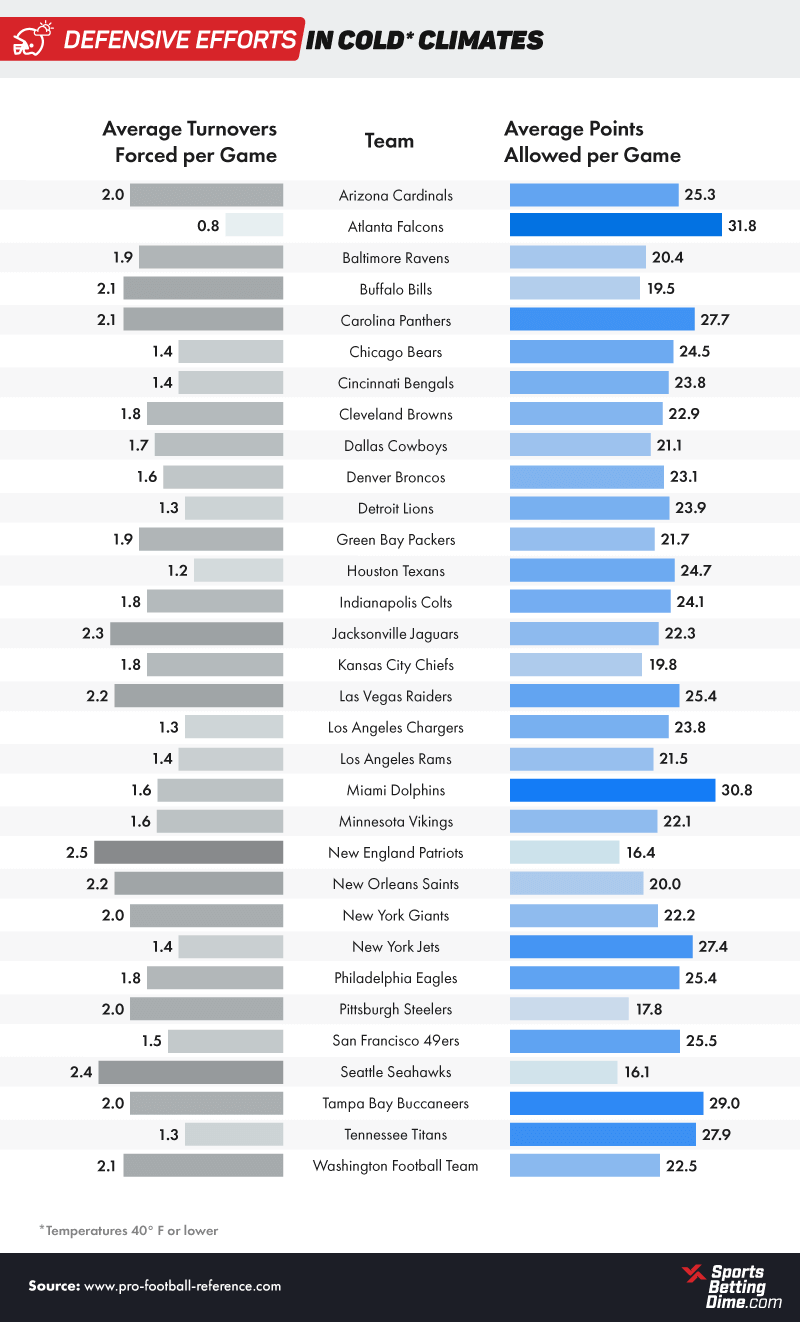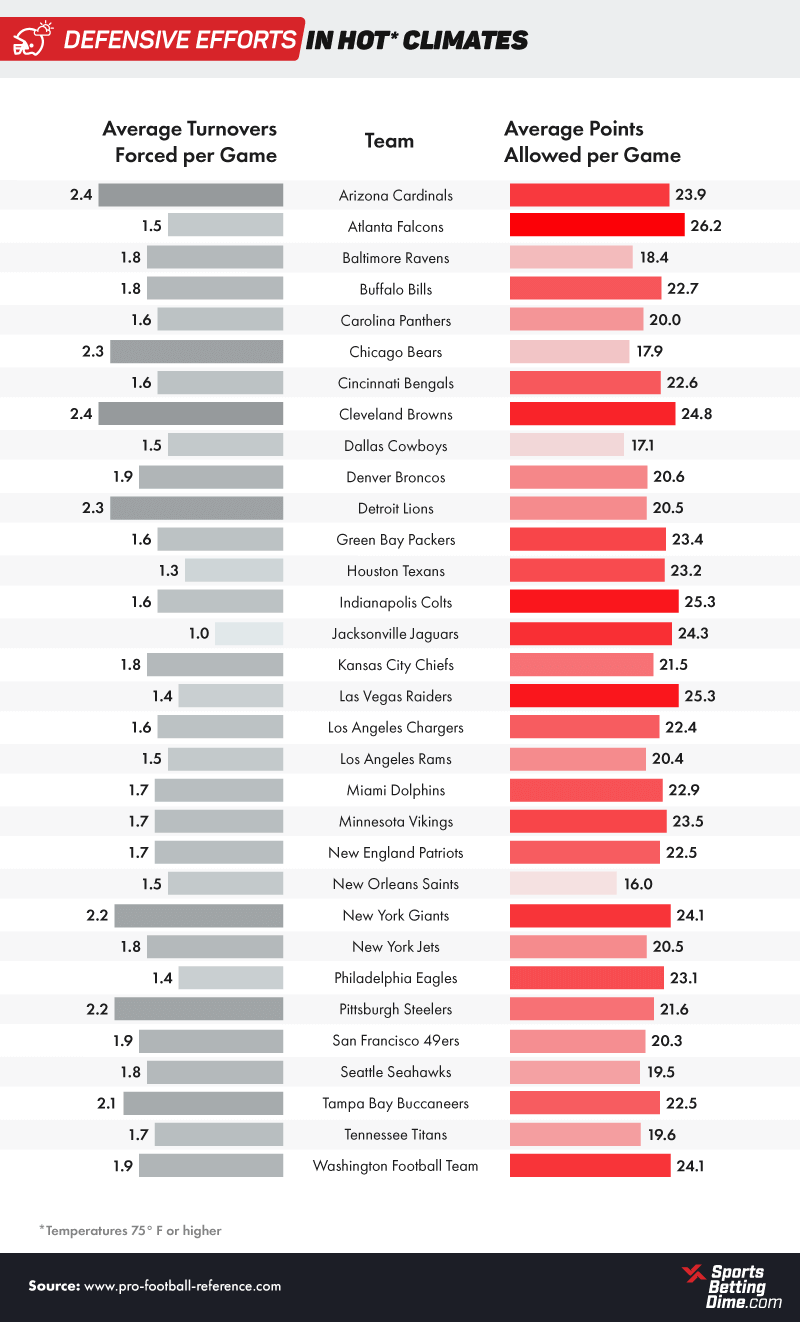Climate and Sports
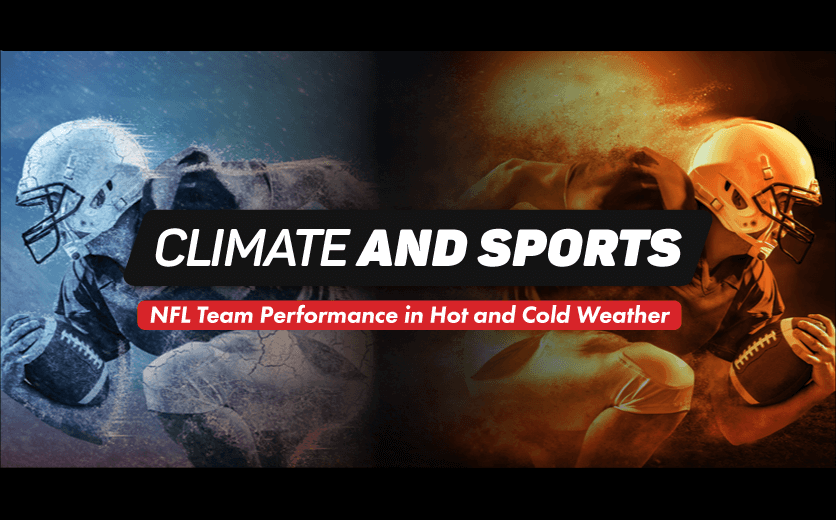

Key Takeaways
- The New England Patriots had the highest win percentage in cold-climate games since 2010 (0.853), while the Atlanta Falcons were winless in their four cold-climate games.
- The Detroit Lions had the highest win percentage in hot-climate games since 2010 (0.750), while the Cleveland Browns had the lowest win percentage (0.200) in hot-climate games.
- The Pittsburgh Steelers had the highest win percentage in indoor games since 2010 (0.769), while the Jacksonville Jaguars had the lowest win percentage (0.143) in indoor games.
- The New England Patriots had the highest win percentage in outdoor games since 2010 (0.0.753), while the Cleveland Browns had the lowest win percentage (0.0.301) in outdoor games.
- Games in hotter climates yielded more passing yards, on average, than games in colder climates (250.7 average passing yards per game in hot climates vs. 234.9 average passing yards per game in cold climates), while games in colder climates yielded more rushing yards, on average, than games in hotter climates (119.0 average rushing yards per game in cold climates vs. 108.5 average rushing yards per game in hot climates).
- The Atlanta Falcons allowed the most average points per game in cold-climate games since 2010 (31.8), while the Seattle Seahawks allowed the least average points per game in cold-climate games (16.1).
- The Atlanta Falcons allowed the most average points per game in hot-climate games since 2010 (26.2), while the New Orleans Saints allowed the least average points per game in hot-climate games (16.0).
How Does Weather Impact Performance? [Study]
Success is a complicated phenomenon. In the context of life, it’s subjective, but in the world of sports, wins and losses are the key differentiators between good teams and bad teams. Practice and talent are among the many variables that seem to have historically influenced performance outcomes. But how about factors that are beyond a team’s control? Let’s look at climate, for instance: The NFL community seems to ceaselessly concern itself with game-time weather, and for good reason.
SportsBettingDime.com thoroughly explored how weather impacts team success and player performance using game data from the NFL since 2010, courtesy of Sports-Reference. For the purposes of their study, games occurring in temperatures of 40 degrees Fahrenheit or below were defined as cold-climate games, while games occurring in temperatures of 75 degrees Fahrenheit or above were defined as hot-climate games.
Who Comes Out on Top?
For the most part, no strong associations were observed on a climate level, however, there were some notable performance differences within individual teams in the different climates.
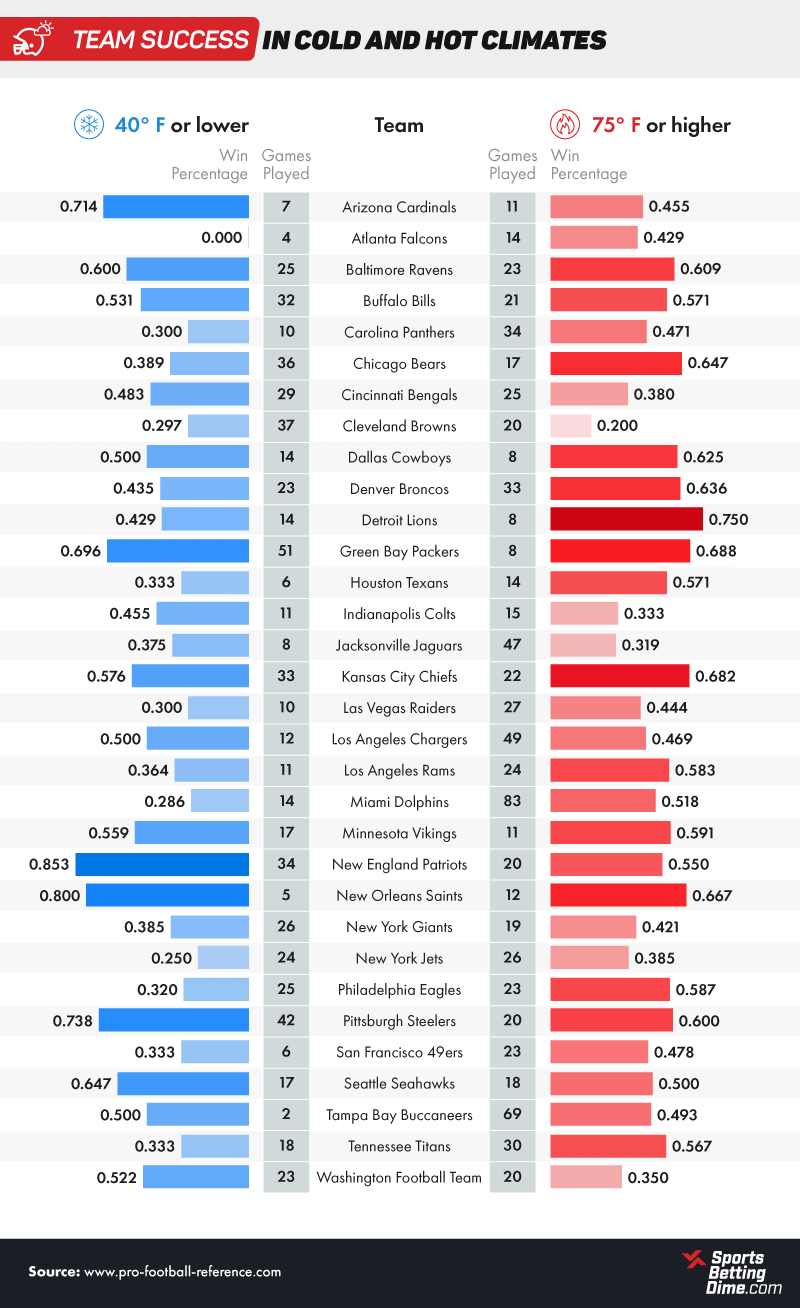
Unsurprisingly, the New England Patriots led the league in cold-climate successes with a win percentage of 85.3%. For the past decade, the Atlanta Falcons were winless in the four cold-climate games they played. The Detroit Lions thrived in hot-climate games, securing a win percentage of 75%. The Cleveland Browns’ hot-climate win percentage of 20% makes them the worst bet in a warm-weather game.
Now, when taking a closer look at these findings, it’s possible you might find yourself asking how influential weather is in the grand scheme of things? Aren’t there so many more important variables I should factor into my bet? These are valid questions, especially when considering the rather complex case of the New England Patriots. More specifically, when taking into account the New England Patriots’ star-studded roster these past 11 years, it seems doubtful that their overwhelming success is tied so closely to climate conditions. However, another dimension to consider – aside from the fact their home games and practices take place in relatively colder climates – is their team morale. It seems Patriots coach Bill Belichick instills an acute discipline in the team, having adamantly asserted that the weather is of no consequence to the team mentality and resulting performance. According to Fox Sports, Coach Belichick had this to say in response to concerns of inclement weather before a game in October 2014: “If you start game-planning for what the weather is going to be and you’re wrong, you’ve wasted a lot of time.” So, before basing a bet off weather alone, at least in the case of team successes, it’s important to understand how it factors into team performance on a case-by-case basis.
Best Indoor and Outdoor Performers
For obvious reasons, it’s important to consider games that have been played in domed and outdoor stadiums. Adding and assessing this dimension to your calculation provides a greater understanding of how the inconsistencies of climate shape game outcomes. It’s true that the four indoor stadiums in the league certainly comprise a small minority of the 32 total stadiums. However, it’s worth evaluating how team performance stats are distributed across the league in both controlled and shifting climate conditions.
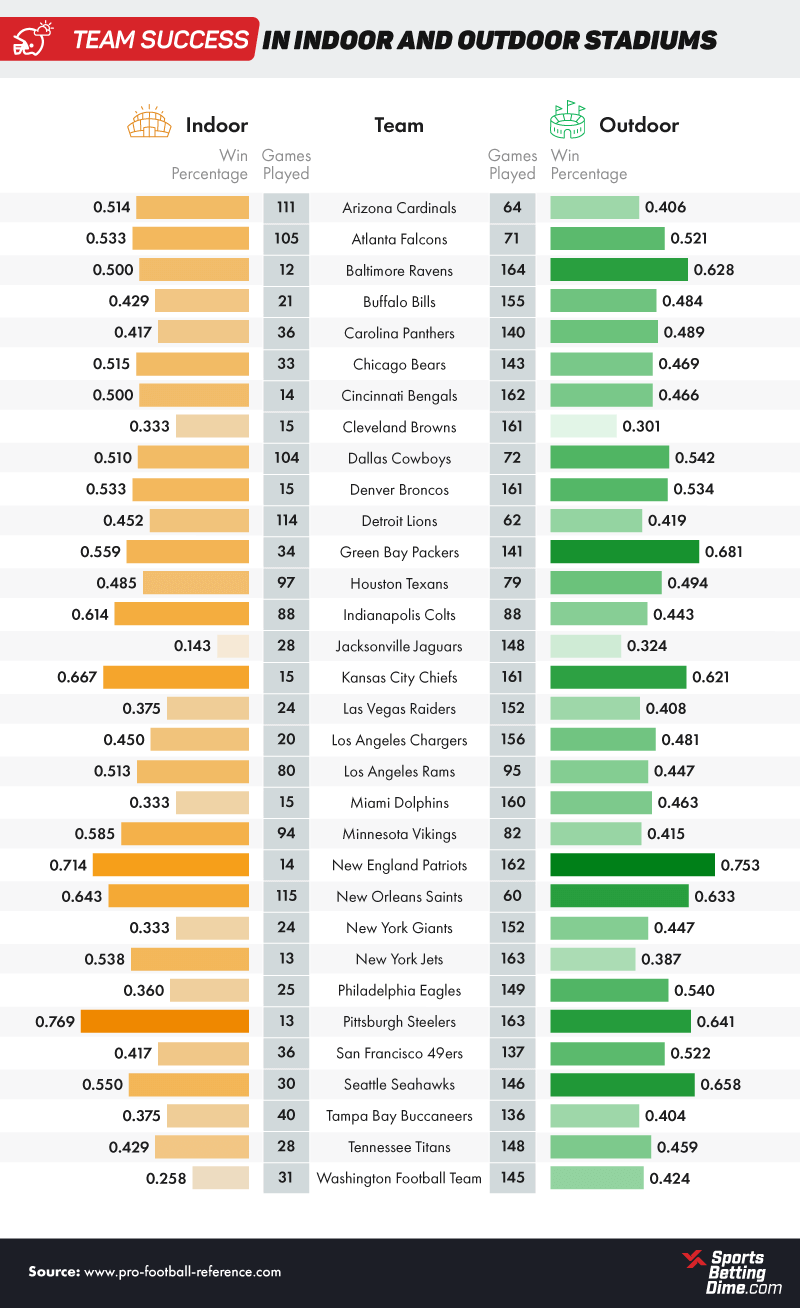
As expected, the data shows that the majority of teams played most of their games in outdoor stadiums. Thirteen teams had higher win percentages indoors, while 19 teams had higher win percentages outdoors. The Pittsburgh Steelers came out on top in the indoor category, with a win percentage of 76.9%. The Jaguars’ win percentage of 14.3% in indoor games inversely placed them as the weakest indoor performers.
When exposed to the elements, our good friends the Patriots and Browns return for a second debut on opposite ends of the stats sheet. The Patriots accumulated an outdoor game win percentage of 75.3%, while the Browns ended the decade with a mere 30.1%. It stands to reason, then, that a bet against the Browns is likely to give you a hefty return on investment.
Team Performance: Points and Yards
Clearly, team win percentages only offer a glimpse of the relationship between weather and football. In acknowledgment of the numerous variables that influence performance outcomes, let’s take a look at how climate conditions relate to more particular statistics. By analyzing the impact of weather on offensive firepower, it’s possible to gain a more nuanced understanding of how climate factors into individual games. Thus, it would be crucial to evaluate a team’s average points, rushing yards, and passing yards per game while accounting for climate conditions.
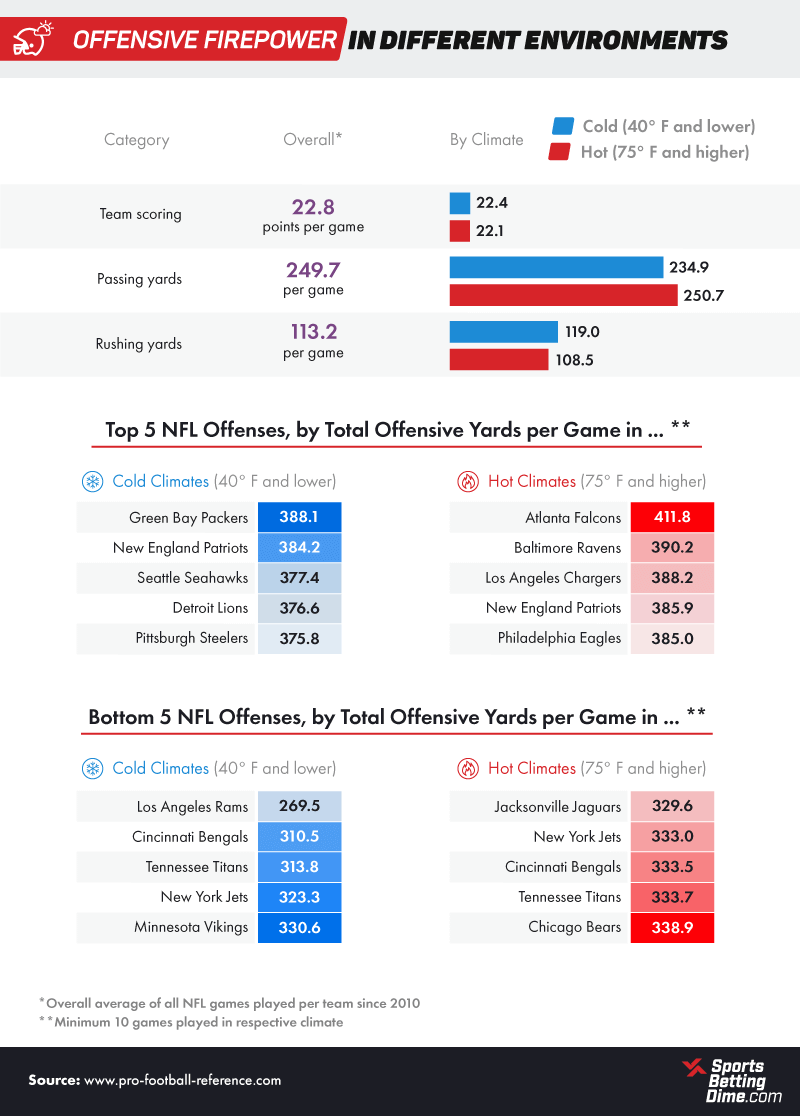
Overall, the Sports Reference statistics demonstrated that passing the ball is the more popular and seemingly successful play in hot climates, while the same is true of rushing yards in cold climates. Indeed, of all the games played in the past 11 years, the average passing yards per game in hot climates is 250.7, while the average passing yards per game in cold climates is 234.9. The average rushing yards per game in cold climates is 119, while the average rushing yards per game in hot climates is 108.5.
Additionally, when looking at individual teams in this data set, one might say the Atlanta Falcons have more than made up for their poor cold-climate performances. In hot climates, the Falcons have secured a staggering 411.8 total offensive yards per game. With powerhouse quarterback Matt Ryan at the helm of their offense since 2008, the success of the Falcons comes as no surprise. Conversely, the Jacksonville Jaguars take the cake for the least successful offense in hot climates with an average of 329.6 total offensive yards per game. In cold climates, the Green Bay Packers saw success with 388.1 total offensive yards per game. The Los Angeles Rams, on the other hand, managed an uninspiring 269.5 total offensive yards per game.
QB Performance: Who’s Making the Magic Happen?
Seeing as we’ve discussed the performance of NFL offenses at the team level, it only makes sense to unpack these numbers and assess how individual performances have contributed to the ‘total offensive yards’ figures we saw above. Essentially, it’s important to understand how a respective team’s quarterback made that magic – or lack thereof – happen.
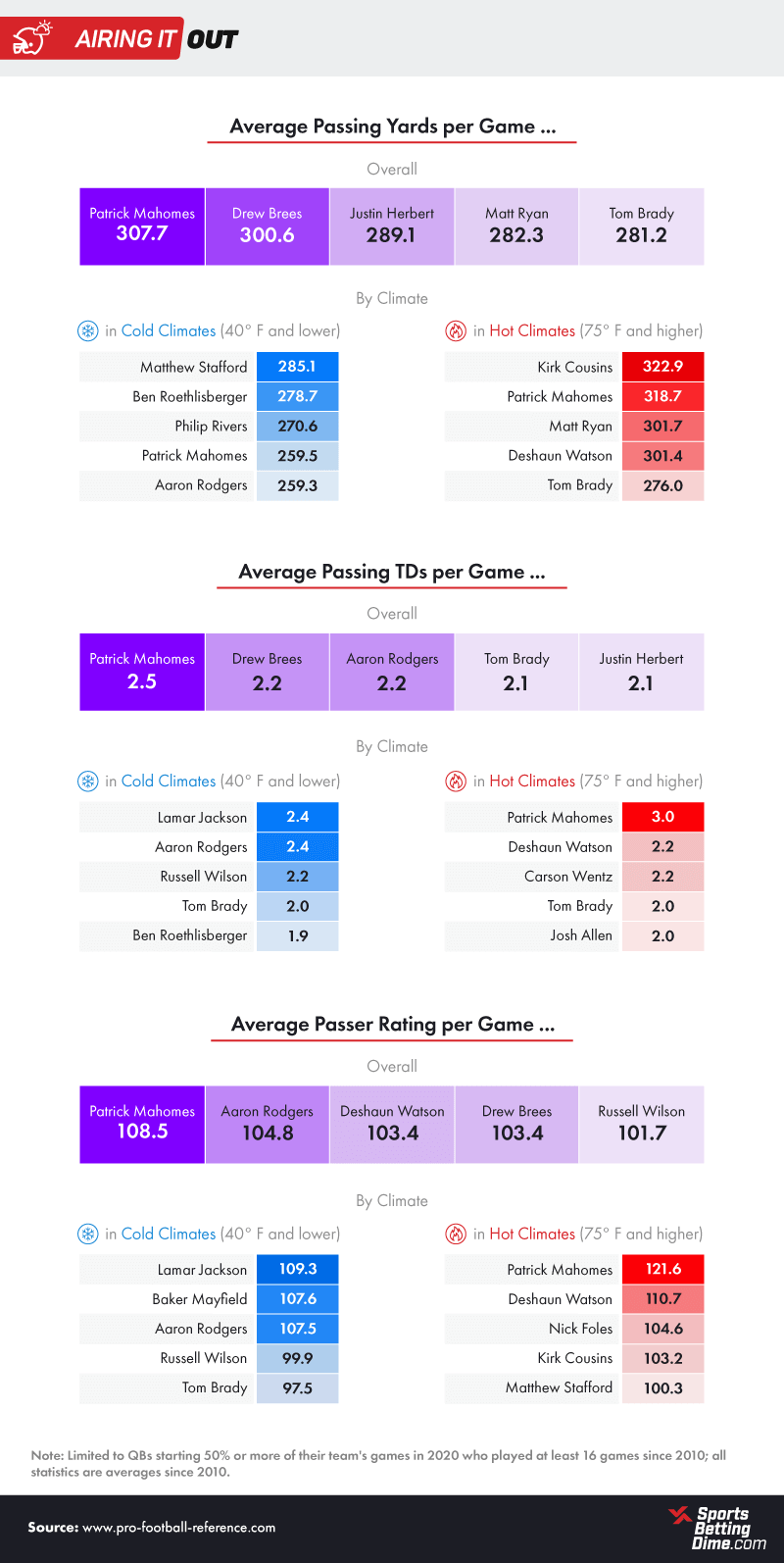
Patrick Mahomes’ contributions since 2017, for instance, granted the Kansas City Chiefs the most average passing yards per game overall. When factoring in the climate, we have to look at Kirk Cousins’ accumulative contributions to the Washington Football Team and Minnesota Vikings, where he averaged 322.9 points per game in hot climates. Matthew Stafford’s league-leading cold-climate average was 285.1 during his time with the Detroit Lions and Los Angeles Rams.
Undeniably, Patrick Mahomes dominates the league with his offensive prowess. He led the league with an overall average of 2.5 passing touchdowns per game and a hot-climate average of three passing touchdowns per game. Additionally, Lamar Jackson’s performance with the Baltimore Ravens yielded a cold-climate average of 2.4 passing touchdowns per game.
Allow me to emphasize yet again that Patrick Mahomes is an offensive force to be reckoned with. Considering an overall passer rating of 108.5 and a hot-climate passer rating of 121.6, it’s safe to say that numbers talk in his case. Similarly, Lamar Jackson makes yet another appearance on the stat sheet. Jackson managed a 109.3 cold-climate passer rating.
Team Defense: Points Allowed and Turnover
While the Atlanta Falcons may have an overpowering offense, they sadly can’t say the same for their defense. The Falcons allowed the most average points per game in both cold- and hot-climate games since 2010. In cold-climate games, Atlanta allowed an average of 31.8 points per game, and in hot-climate games, they allowed 26.2. The case of the Falcons is particularly revealing vis-a-vis assessing whether to bet on a specific game outcome. When betting on a Falcons win, for example, you have to consider that while their offensive firepower has a proven record of success, their defensive talent is conversely lackluster. This sort of inconsistency, then, may make it difficult to accurately assess the likelihood of a game’s outcome.
Moving on to cold weather performers, the Seattle Seahawks allowed the least average points per game in cold climates, with a figure of 16.1. In hot-climate games, the New Orleans Saints allowed the least average points per game, managing 16.
Final Thoughts on the Impact of Climate on NFL Games
Generally speaking, the relationship between climate conditions and performance outcomes certainly exists, but it becomes more complicated when attempting to assess the strength of their correlation. However, even when accounting for confounding variables, the data clearly demonstrated some conclusions worth noting. If there’s anything you should take from this article, it’s the following:
- The New England Patriots thrive in cold-weather climates.
- The Cleveland Browns have exceedingly low win percentages in both cold and hot climates.
- On average, teams are more likely to run the ball more in cold climates and more likely to throw the ball more in hot climates.
- Patrick Mahomes is (arguably) the safest bet with respect to QBs, considering he puts up chart-topping numbers in numerous statistical categories.
- The Atlanta Falcons defense puts up the weakest performance in both cold and hot climates.
It’s clear that numbers talk in many betting scenarios; however, reality may sometimes contradict theoretically expected outcomes. So, it’s ultimately up to you to decide what outcome you’ll invest in. SportsBettingDime.com puts you in the driver’s seat and gives you the information you need. All you need to bring to the table is your intuition. For close to a decade, SBD has connected people with first-rate online sports betting sites. Whatever tools you need to come out on top of the bet, SportsBettingDime.com is here to support you.
Methodology and Limitations
We collected NFL game data from www.sports-reference.com for all regular-season games played since Week 1 in 2010. Along with the final score and box score statistics, we also collected information regarding the stadium type (indoor or outdoor) and the recorded temperature on game day (available and impacting outdoor games only).
No statistical testing was performed, so the claims listed above are based on means alone. As such, this content is exploratory and is presented for informational purposes only.
Fair Use Statement
Given the open-endedness of climate’s relationship to sports, it’s certainly to your advantage to further this discussion. If you find our data useful, feel free to spread the knowledge. Just make sure you do so for non-commercial use and provide a link back to our site.
Let's have fun and keep it civil.


